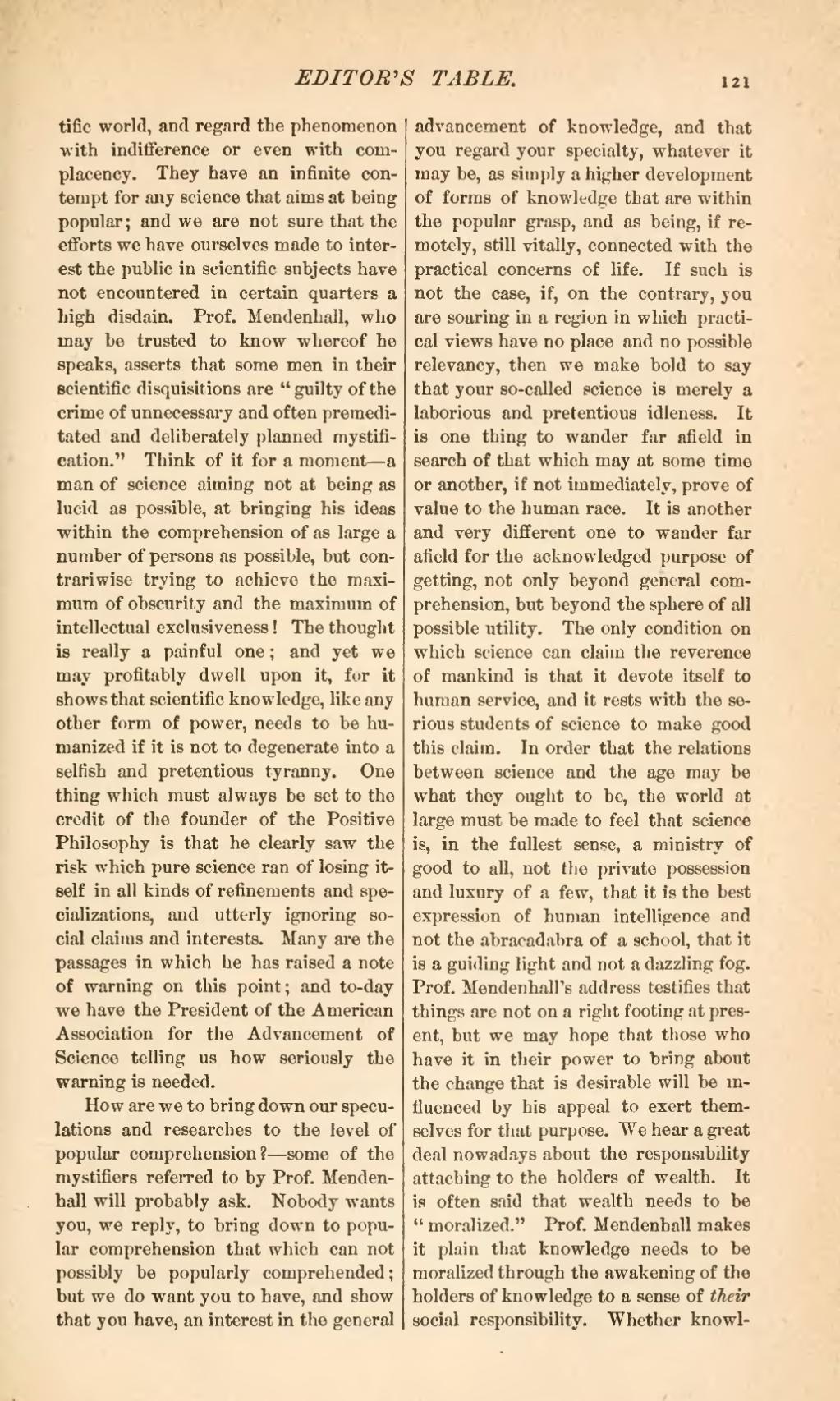tific world, and regard the phenomenon with indifference or even with complacency. They have an infinite contempt for any science that aims at being popular; and we are not sure that the efforts we have ourselves made to interest the public in scientific subjects have not encountered in certain quarters a high disdain. Prof. Mendenhall, who may be trusted to know whereof he speaks, asserts that some men in their scientific disquisitions are "guilty of the crime of unnecessary and often premeditated and deliberately planned mystification." Think of it for a moment—a man of science aiming not at being as lucid as possible, at bringing his ideas within the comprehension of as large a number of persons as possible, but contrariwise trying to achieve the maximum of obscurity and the maximum of intellectual exclusiveness! The thought is really a painful one; and yet we may profitably dwell upon it, for it shows that scientific knowledge, like any other form of power, needs to be humanized if it is not to degenerate into a selfish and pretentious tyranny. One thing which must always be set to the credit of the founder of the Positive Philosophy is that he clearly saw the risk which pure science ran of losing itself in all kinds of refinements and specializations, and utterly ignoring social claims and interests. Many are the passages in which he has raised a note of warning on this point; and to-day we have the President of the American Association for the Advancement of Science telling us how seriously the warning is needed.
How are we to bring down our speculations and researches to the level of popular comprehension?—some of the mystifiers referred to by Prof. Mendenhall will probably ask. Nobody wants you, we reply, to bring down to popular comprehension that which can not possibly be popularly comprehended; but we do want you to have, and show that you have, an interest in the general advancement of knowledge, and that you regard your specialty, whatever it may be, as simply a higher development of forms of knowledge that are within the popular grasp, and as being, if remotely, still vitally, connected with the practical concerns of life. If such is not the case, if, on the contrary, you are soaring in a region in which practical views have no place and no possible relevancy, then we make bold to say that your so-called science is merely a laborious and pretentious idleness. It is one thing to wander far afield in search of that which may at some time or another, if not immediately, prove of value to the human race. It is another and very different one to wander far afield for the acknowledged purpose of getting, not only beyond general comprehension, but beyond the sphere of all possible utility. The only condition on which science can claim the reverence of mankind is that it devote itself to human service, and it rests with the serious students of science to make good this claim. In order that the relations between science and the age may be what they ought to be, the world at large must be made to feel that science is, in the fullest sense, a ministry of good to all, not the private possession and luxury of a few, that it is the best expression of human intelligence and not the abracadabra of a school, that it is a guiding light and not a dazzling fog. Prof. Mendenhall's address testifies that things are not on a right footing at present, but we may hope that those who have it in their power to bring about the change that is desirable will be influenced by his appeal to exert themselves for that purpose. We hear a great deal nowadays about the responsibility attaching to the holders of wealth. It is often said that wealth needs to be "moralized." Prof. Mendenhall makes it plain that knowledge needs to be moralized through the awakening of the holders of knowledge to a sense of their social responsibility. Whether knowl-
